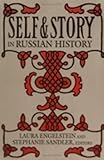Self and Story in Russian History / ed. by Laura Engelstein, Stephanie Sandler.
Material type: TextPublisher: Ithaca, NY : Cornell University Press, [2018]Copyright date: ©2000Description: 1 online resource (384 p.) : 24 halftonesContent type:
TextPublisher: Ithaca, NY : Cornell University Press, [2018]Copyright date: ©2000Description: 1 online resource (384 p.) : 24 halftonesContent type: - 9781501723933
- 947/.07 22
- online - DeGruyter
| Item type | Current library | Call number | URL | Status | Notes | Barcode | |
|---|---|---|---|---|---|---|---|
 eBook
eBook
|
Biblioteca "Angelicum" Pont. Univ. S.Tommaso d'Aquino Nuvola online | online - DeGruyter (Browse shelf(Opens below)) | Online access | Not for loan (Accesso limitato) | Accesso per gli utenti autorizzati / Access for authorized users | (dgr)9781501723933 |
Frontmatter -- Contents -- Preface -- List of Abbreviations -- Introduction -- 1. Bakhtin, Lotman, Vygotsky, and Lydia Ginzburg on Types of Selves: A Tribute -- 2. The Obverse of Stalinism: Akhmatova's Self-Serving Charisma of Selflessness -- 3. Writing the Self in the Time of Terror: Alexander Afinogenov's Diary of 1937 -- 4. Publicizing the Imperial Image in 1913 -- 5. The Silent Movie Melodrama: Evgenii Bauer Fashions the Heroine's Self -- 6. Girl Talk: Lydia Charskaia and Her Readers -- 7. The Russian Myth of Oscar Wilde -- 8. Hysterical Episodes: Case Histories and Silent Subjects -- 9. Weber into Tkachi: On a Russian Reading of Gerhart Hauptmann's Play The Weavers -- 10. Tolstoy's Diaries: The Inaccessible Self -- 11. Storied Selves: Constructing Characters in The Brothers Karamazov -- 12. Self and Sensibility in Radishchev's.Journey from St. Petersburg to Moscow: Dialogism, Relativism, and the Moral Spectator -- 13. Enlightenment and Tradition: The Aestheticized Life of an Eighteenth-Century Provincial Merchant -- 14. Personal Testimony and the Defense of Faith: Skoptsy Telling Tales -- Notes on Contributors -- Index
restricted access online access with authorization star
http://purl.org/coar/access_right/c_16ec
Russians have often been characterized as people with souls rather than selves. Self and Story in Russian History challenges the portrayal of the Russian character as selfless, self-effacing, or self-torturing by exploring the texts through which Russians have defined themselves as private persons and shaped their relation to the cultural community. The stories of self under consideration here reflect the perspectives of men and women from the last two hundred years, ranging from westernized nobles to simple peasants, from such famous people as Tolstoy, Dostoyevsky, Akhmatova, and Nicholas II to lowly religious sectarians. Fifteen distinguished historians and literary scholars situate the narratives of self in their historical context and show how, since the eighteenth century, Russians have used expressive genres—including diaries, novels, medical case studies, films, letters, and theater—to make political and moral statements. The first book to examine the narration of self as idea and ideal in Russia, this vital work contemplates the shifting historical manifestations of identity, the strategies of self-creation, and the diversity of narrative forms. Its authors establish that there is a history of the individual in Russian culture roughly analogous to the one associated with the West.
Mode of access: Internet via World Wide Web.
In English.
Description based on online resource; title from PDF title page (publisher's Web site, viewed 26. Apr 2024)


